Empowering students with language-based learning differences
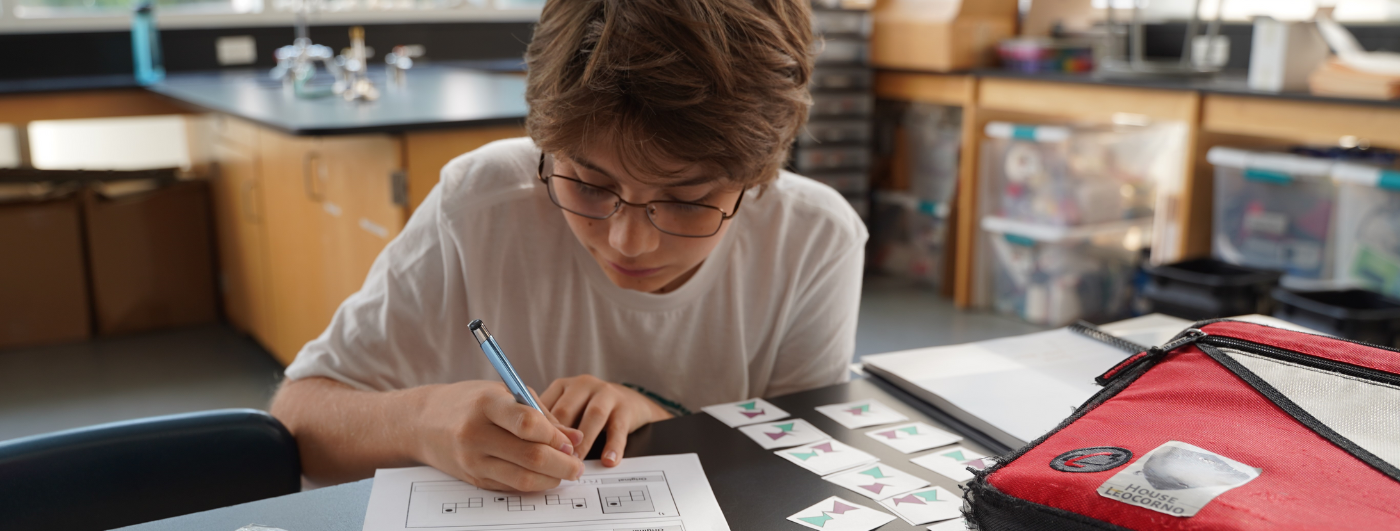
Siena Blog



The Siena School Blog
Discover, Learn, Celebrate, and Empower
Welcome to Siena's blog, your source for helpful, cutting-edge resources tailored to teachers, parents, and other advocates in the learning differences community. We are dedicated to providing a wealth of curated knowledge spanning various topics, ranging from dyslexia advocacy and awareness to classroom teaching strategies, heritage month profiles, and social and emotional health.
Discover innovative classroom strategies that inspire creativity and foster a love of learning.
Our commitment to social-emotional wellness ensures that we provide valuable insights into healthy student development and self-advocacy.
Discover resources, reading and podcast recommendations, volunteering opportunities, and more for parents in the LD community.
Our important heritage month posts highlight key people, offer reading and podcast recommendations, and more.
Calming Strategies in the Classroom
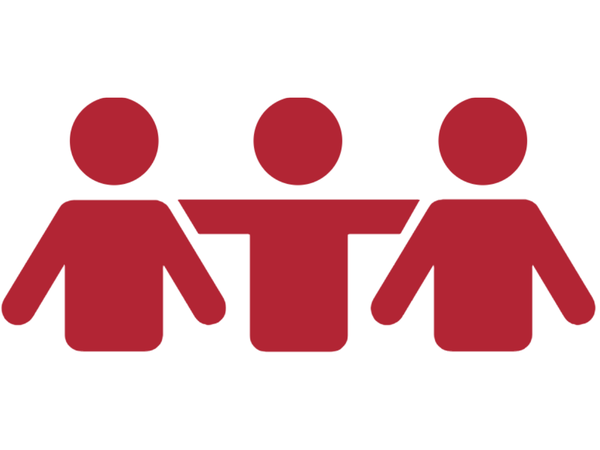
Avg. read time 5-6 min.
Imagine your student is in the classroom learning a new lesson and begins to feel anxious. They don’t want to miss the lesson or lose learning time, but they also want to avoid feeling the big feelings!
The Take a Break Space: Calming Strategies in the Classroom folder that The Siena School uses is specifically designed to help students take a few minutes to (re)focus their attention on a multisensory coping strategy to reset and reengage in the lesson. It collects intentional calming tools and strategies that are helpful for all Siena students to go from “Fight, Flight, and Freeze” to “Rest and Digest.”
Also, it promotes relaxation and better focus by shifting attention from dysregulation to mindful soothing stimuli, creating a safe space for self-regulation.
Classroom Calming Strategies for Teachers
It’s very important to give students ready access to calming images and other strategies during the school day. Among other social-emotional benefits, this makes taking care of their mental health a multisensory experience for them, as well as complements their academic development.
Sensory-focused activities remind our students to pay attention to the physical sensations accompanying their emotions. This expands the social-emotional experience and understanding for our students, reminding them that their emotions have a purpose and encouraging reflection on why that feeling happened. When they understand the why, they can then have greater awareness of what they need and ask for it.
Siena teachers are encouraged to remind students to utilize the Take a Break folder and actively send the student to the calming space for a reset. This allows for the student to feel empowered to take the break they need, as well as have agency over the strategy they choose to reset. The anchoring message here is “It’s okay to take a break” for students and teachers alike.
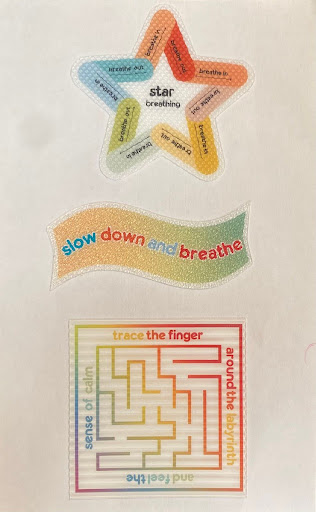
Calming Tools for Classroom Use
Siena teachers on all three campuses have access to our Take a Break folders, and the counseling team will be visiting homerooms for all grades. These folders are full of print graphics, short affirmative meditations, and more, such as:
- Coloring pages — Coloring (or drawing) can greatly help students focus their energy in the moment to help them regulate, particularly when it’s a more detailed design that requires slow and careful movements and focus. See Creative Color Lab for examples that we’ve used at Siena.
- Tactile stickers — Students can add sensory strip stickers to their water bottles, computers or anything else they carry for easy, portable access to calming exercises (such as Star Breathing).
- Positive affirmations — Students can use these short phrases (such as “I am here. I am safe” and “I deserve to be seen”) to ground themselves in moments of dysregulation or self-doubt.
- Spot It/Name It Graphics — Using A Little Spot of Feelings and Emotions (from artist Diane Alber) helps students to “spot” their emotions and clues to better understanding what they are feeling and why. Students in Social and Emotional Learning classes are practicing writing and communicating “I” statements with blanks for them to specify their feelings — such as, “I feel confused when I’m in math class because I don’t understand yet. I need to ask for help.”
- Movement exercises — This helps our students to take an in-class movement break discreetly. The goal is to provide an opportunity to practice movement without disruption. One way we do this is by encouraging them to move to the back of the room and do quiet body stretches; those who want to stay seated can do chair yoga to get those wiggles out.
See these Calming Posters for Your Break Space from Teachers Pay Teachers for additional visual resources for use in classrooms and counseling offices.
How Parents Can Support Students at Home
We all need to take a break throughout the day. Whether it's for 5 minutes to step away and shift your surroundings or to take your full lunch break, we should be telling ourselves “It’s okay to take a break” and mentally reset for whatever task is in front of us.
Parents can talk to their children about strategies that help them to feel focused, confident, and capable in the classroom. Make a list and practice role-play exercises of the “I” statement so they feel assured in communicating their emotions and what they need for success. When they do share a difficult moment in their day, validate their feelings and help them reflect on what they can learn from their experience or what they can do differently next time to feel better.
Resources from Siena’s Blog
Siena’s individualized approach creates a safe, responsive, and nurturing environment that supports our students’ academic and emotional well-being. Our teachers and staff also encourage students to use quiet, focusing fidgets in the classroom to regulate their emotions and ease stress. See this blog post about the benefits of fidgets for Siena students. For more on the value of fidgets for neurodiverse students read The Science Behind Fidget Toys.
See other posts of interest in our Social and Emotional Health blog category, such as these about learning differences and confidence and online and offline boundaries for teens.
The Siena School, a national leader in dyslexia education, serves bright, college-bound students with dyslexia and other language-based learning differences on DC Metro area campuses in Silver Spring, MD (grades 3-4 and 5-12) and Oakton, VA (grades 3-12).
Unlocking History Through Hands-On Learning: Siena 6th Graders Explore Ancient Egypt
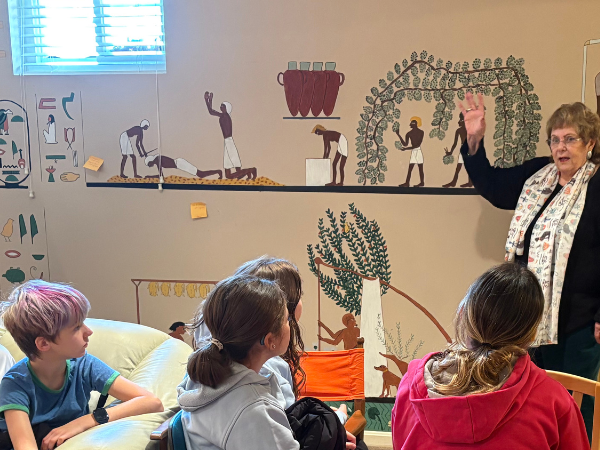
Avg. Read Time 3-4 min.
At The Siena School, learning is not something students simply absorb — it’s something they experience. In the Fall 2025 semester, 6th graders from Siena’s Forest Glen campus dove into the world of Ancient Egypt through immersive, multisensory projects designed to build deep understanding, spark curiosity, and make history come alive.
Hands-On Learning at Siena
As part of their Social Studies unit on Ancient Egypt and pharaohs’ tombs with Siena middle school teacher Pinki Shah, students spent a week “mummifying” organs and crafting their own canopic jars. These creative activities highlighted the purpose and symbolism behind mummification, what was placed in a pharaoh’s tomb, and how Egyptians prepared for the afterlife.
Through the kind tactile learning that especially benefits students with language-based learning differences, the class explored:
- The religious beliefs that shaped burial practices
- The meaning behind preserving organs
- The artistry and ritual of canopic jars
- The human experience of preparing for an afterlife
This kind of experiential activity is exactly what Siena strives for — instruction that honors how bright, language-diverse learners thrive when given visual, hands-on pathways to understand complex material.
Mapping the Nile River
.jpg)
Lining the classroom walls are the students’ Nile River recreations — a vibrant visual demonstration of how geography shaped civilization. Ms. Shah’s students learned how the Nile flows from south to north, how the ancient Egyptians depended on the river’s predictability, and why pharaohs were buried at specific points along its banks.
By designing their own river systems, students used spatial reasoning, visual creativity, and multisensory design to grasp how environment, religion, and community structure intersected in Ancient Egypt.
Experiential Learning While Visiting Queen Nefertari’s Tomb
One of the highlights of the unit was a field trip to visit a detailed recreation of Queen Nefertari’s tomb at a nearby community member’s studio. Forest Glen 6th graders visited local resident and artist Emily, who spent three years hand-painting the tomb inspired by what she described as one of the “most beautiful” ancient spaces she saw during her travels. For Ms. Shah and her class, walking into the space felt like stepping back in time. Students were able to see:
- The religious symbolism painted on the walls
- Artistic styles used in royal burials
- The scale, colors, and storytelling that surrounded a queen’s journey to the afterlife
Students were quite impressed by this immersive art experience:
- “The art was so beautiful. I learned about the [scarab] beetles and how they walked around using the stars and found their way. I think it is really cool how she painted the whole basement [...]. Her art is beautiful and I'm glad I got to see it.” —Jayne
- “Her paintings were beautiful and I can't believe that she did them by herself! We learned about how she made them and why. She also talked about how she went to see an Egyptian tomb [in person]. She told us how they made the tombs and how they carved it. One new thing I learned is that the Egyptians carved in black granite with copper.” —Isabel
Emily’s meticulous and passionate work enriched students’ understanding far beyond what a textbook could provide. Her dedication to historical accuracy and artful recreation offered students an unforgettable (and tangible) connection to the content — and Siena is deeply grateful for her generosity.
Through project-based tasks, visual supports, creative expression, and real-world experiences like these, students not only learned history through this unit — they built meaning, made connections, and developed a richer understanding of human civilization.

Additional Siena Resources
See The Siena School blog for more posts of interest about Siena’s hands-on education, including The Benefits of Reading to Dogs, Making Career Possibilities Real for Students, and the benefits of Dyslexia-Friendly Book Editions.
The Siena School, a national leader in dyslexia education, serves bright, college-bound students with language-based learning differences on DC Metro area campuses in Silver Spring, MD (grades 3-4 and 5-12) and Oakton, VA (grades 3-12).
The Benefits of Reading to Dogs
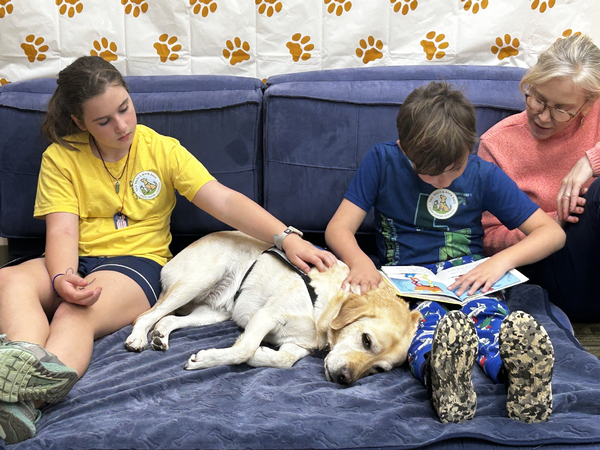
Avg. Read Time 3-4 min.
Siena Community Connections and Service
Wider community partnerships and intentional community outreach are key parts of The Siena School’s mission and commitment for all students to boost important literacy skills and social-emotional awareness.
A particularly valuable service and experiential learning opportunity for Siena Northern Virginia students was a recent elementary field trip to Oakton Library in Virginia for an event with Tail Wags & Book Bags, a DC-area nonprofit organization that connects assistance dogs with educators and schools to benefit LD and neurodiverse students.
Boosting Literacy Skills by Reading to Dogs
Siena Northern Virginia elementary students recently took a special trip to the Oakton Library for a visit with Karma, a certified therapy dog, and her owner, Karin Hemphill — an educator and Executive Director of the DC-area nonprofit Tail Wags and Book Bags, which partners with schools to inspire young readers.
During their time together, students took turns reading aloud to Karma, who listened patiently and attentively. Her calm, friendly presence helped Siena’s young readers feel comfortable and confident sharing their stories — as well as highlight their commitment to learning by doing and giving back.
.png)
Karma, a Yellow Labrador Retriever, was trained by Canine Assistants and ultimately became a therapy dog rather than a service dog. She can do other things (e.g., retrieve items and sign out books with her library card).
Siena Northern Virginia is planning more visits with Karma in the future. Karma’s visit reminded everyone that encouragement can come in many forms, even a wagging tail and a gentle nudge. This experience not only supported literacy skills but also nurtured perseverance, empathy, and joy in learning.
Learning by doing and nurturing social-emotional growth are essential parts of every child’s journey at Siena. Experiences like reading with therapy dogs build self-esteem, strengthen communication, and show students that reading can be joyful, calming, and empowering.
Benefits of Reading to Dogs
There’s a growing body of research showing that when children read aloud to dogs, there are real benefits for adolescents’ fine and gross motor skills, spatial awareness, anxiety, depression, and more (Source: Tail Wags & Book Bags).
Here are some additional sources to help understand the layered benefits of reading to dogs — which Siena Northern Virginia students experienced firsthand:
- One study found that second-grade students who read aloud to dogs showed significantly improved attitudes toward academic reading (Source: Tufts Now)
- A Canadian study of 7- to 8-year-olds found that reading performance, social competence, and behavior, improved particularly after reading to a dog rather than to an adult alone (Source: PubMed)
- More generally, children reading to dogs report feeling less anxious, more relaxed and more confident about reading — because the dog offers a comforting, non-judgmental audience (Source: Family Education)
- The literacy organization Tails That Teach notes that having a domesticated animal present while reading can increase reading fluency by 12-30% in some settings (Source: Tails That Teach)
While the research is still evolving, there’s a clear takeaway: reading to a therapy dog can motivate young readers, reduce performance-pressure, build confidence and engagement — all important ingredients for the literacy growth and social-emotional awareness that is central to The Siena School’s mission.
Additional Siena Resources
See The Siena School blog for more posts of interest, including Mental Health Awareness Month 2025, Learning Differences and Student Confidence, and the benefits of Dyslexia-Friendly Book Editions.
The Siena School, a nationwide dyslexia education leader currently in its 20th year, serves bright, college-bound students with language-based learning differences on DC Metro area campuses in Silver Spring, MD (grades 3-4 and 5-12) and Oakton, VA (grades 3-12).
